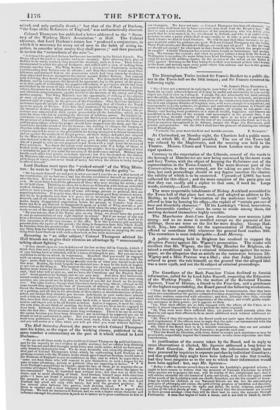The Birmingham Tories invited Sir Francis Burdett to a public
din. ner in the Town-hall on the 18th instant ; and Sir Francis returned the following reply.
" St. James's Place, December L " Sir—I lose not a moment in replying to your letter of the 30th, just put into my hand, for an early arktioeledgment of it may be useful And satisfactory to you melt& object you had in view its visiting it. 1 accept. Sir, not reluctantly but most cordially and cheerfully, the invitation you have done me the honour to transmit, and prowl Of being called upon to coOperate with every class of my countrynien honestly attached to the civil and religious liberties of England, who, w ith sense enough to comprelieu Saud consequently to justly estimate, its glorious and unrivalled institutions in Chinch and State—its well-balanced powers, orders, and degrees, all verging to one point—true liberty—and having been productive of a state of wealth, happiness, and renown un- paralleled in the history of the aucieut and unexampled in the present ('one, I act proud of beitig thought worthy of being called upon at an hoer of apprehended danger to be aiding and uniting with the rest of my countrymen who think as I do, in leave no exertion unemployed in its defence, maugre the Pope, the Precursors. paid patriot, and pretender. On the 18th I shall have the pleasure of making one amongst you at Birmingham.
"I remain, Sir, your most obedient and humble servant. F. BURDETT."
At Chelmsford, on Monday night, the Chartists bad a public meet. ing ; at which Mr. C. Branfil presided. Tbe use of the Town-hall was refused by the Magistrates, and the meeting was held in the Theatre. Messrs. Cleave and Vincent from London were the prin. cipal speakers. Contrary to the expectation of the Liberals, several of the wards in the borough of Manchester are now being canvassed by the more warm and fiery Tories, with the object of keeping the Reformers out of the representation in the Town-Council. The more discreet part of the Conservatives, as they are termed, are for tdking no part in the elec. tion, lest such proceedings should in any degree sanction the charter, the validity of which is to be contested. Upwards of 2,000/. has been
collected for this object ; and the more sanguine of the party give out that they can readily add a cipher to that sum, if need be. Large words, certainly.—Leeds Mercury.
The more respectable inhabitants of Bishop Auckland assembled in the Town-hall of that place last week, and adopted an address to Dr. Maltby, to testify their "detestation of the malicious insult" lately offered to him by burning his effigy—the exploit of "certain perions of base and disorderly character." Of his Lordship's "kind, benevolent, and honourable conduct," since he came to reside among them, the meeting declared themselves highly sensible.
The Manchester Anti-Corn Law Association now musters 1,000 strong : and as no name is enrolled except on the payment of five shillings, there are none on the list for mere display. George Had- field, Esq., late candidate for the representation of Bradford, has offered to contribute 1001. whenever the general fund reaches 900/.
The committee is most indefatigable.—Leeds Mercury.
A public meeting held in Brighton has resolved to support the Brighton Patriot against Mr. Wigney's prosecution. The reader will
recollect that Mr. Wigney, the late Whig Member for Brighton, ob- tained a conditional rule for a criminal information against the news. paper, on the allegation that an article on the connexion between Mr. Wigney and a Miss Preston was a libel ; also that Judge Littledale refused to grant the rule himself, on the ground that the alleged libel was a mere squib, and not the fit subject of criminal proceedings.


























 Previous page
Previous page